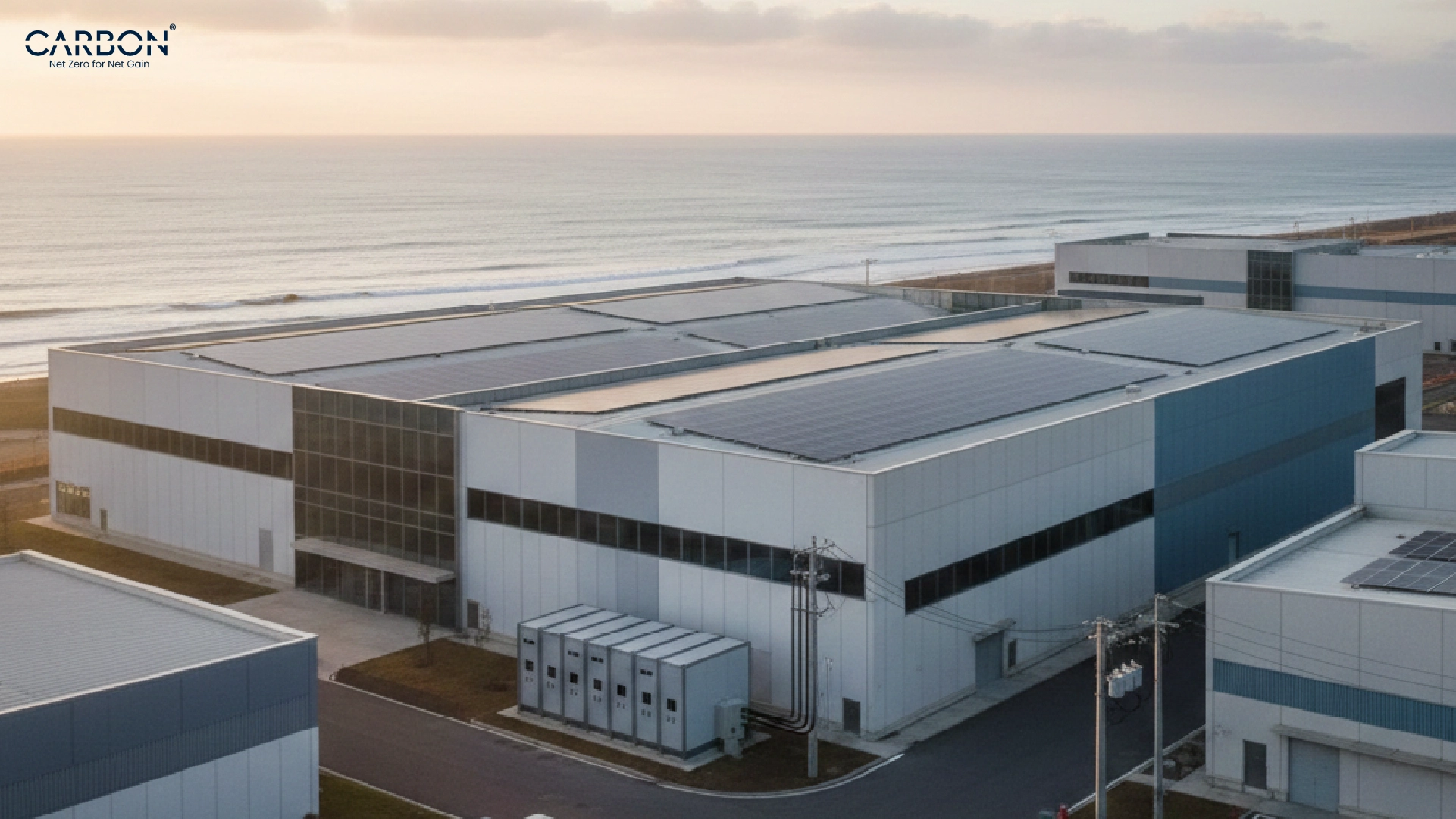Environmental accountability and sustainability have become more than buzzwords. The strategic integration of efficiency with sustainable compliance is now emerging as a pivotal element in redefining business success.
This integration of an environmental management system is about transforming compliance into a strategic advantage that opens doors to new business opportunities, partnerships, and avenues for growth.
For compliance officers and corporate strategists, the challenge lies in weaving these practices into the very fabric of their strategy.
This blog aims to unravel the complexities and opportunities presented by Environmental and Sustainability Management Systems in the corporate world.
Our goal is to offer a comprehensive guide on how sustainability can go beyond mere compliance, enhancing overall strategy and creating new business opportunities. We will explore the strategic implementation of CarbonMinus’s software for sustainability management that can transform compliance into an advantageous tool.
Proper compliance can enable businesses to exceed sustainability goals while fostering operational efficiency and driving growth.
What Are Sustainability Management Systems?
Sustainability Management Systems (SMS) represent a transformative approach in today’s business environment, where the focus on sustainability is more intense than ever.
These systems are comprehensive frameworks that enable organizations to monitor, manage, and report on their environmental performance and sustainability initiatives.
The strategic implementation of an SMS turns various aspects of sustainability – from resource utilization and waste management to energy efficiency and carbon footprint reduction – into a cohesive strategy.
It provides a structured way for businesses to meet and exceed regulatory requirements while aligning with broader environmental and sustainability goals.
Through the strategic implementation of an SMS, companies can transition from traditional compliance-driven approaches to strategic, sustainability-focused operations.
What is an Environmental Management System?
Environmental Management Systems primarily focus on reducing the environmental impact of an organization’s activities, products, and services.
Such systems tend to be more focused on compliance with environmental regulations and reducing specific environmental impacts like emissions, waste, and resource consumption.
Often structured around specific standards such as ISO 50001, they provide guidelines for an effective energy management systems.
Mostly, an EMS involves assessing environmental impacts, setting targets for improvement, implementing measures to achieve these targets, and monitoring progress.
Environmental and Sustainability Goals
Environmental and sustainability goals are at the heart of an SMS.
These goals go beyond basic compliance with environmental regulations, extending into the realm of proactive environmental stewardship and sustainable business practices.
Key environmental goals often include reducing greenhouse gas emissions, minimizing waste, conserving natural resources, and promoting renewable energy use.
Sustainability goals, meanwhile, focus on long-term impacts, such as sustainable supply chain management, social responsibility, and economic sustainability.
For a business, setting and pursuing these goals through an SMS involves a few critical steps:
- Goal Identification and Alignment: Identifying environmental and sustainability goals that align with the company’s vision and strategy is crucial. This alignment ensures that the sustainability efforts are not just add-ons but are integrated into the core business model.

- Strategic Implementation: Strategic implementation of an SMS requires integrating the system into existing business processes, ensuring that it complements and enhances overall operational efficiency.
- Performance Tracking: An effective SMS should have mechanisms to track performance against set goals. Tools within the system, such as software for sustainability management, help in monitoring progress and identifying areas for improvement.
- Stakeholder Engagement: Involving stakeholders – from employees to suppliers, customers, and the community – in the company’s sustainability efforts is vital. This engagement fosters a culture of sustainability and drives collective efforts towards the set goals.
- Continuous Improvement: Sustainability is an ongoing journey. An SMS should be adaptable and flexible, allowing for continuous improvement and alignment with emerging sustainability trends and practices
The Role of Sustainability Management in Business Strategy
Strategic implementation of an environmental management system into the core strategy of a business is no longer a choice but a necessity in the contemporary corporate world.
The role of sustainability in business strategy extends far beyond compliance and risk management. It is now a fundamental driver of innovation, competitive advantage, and long-term profitability.
A well-integrated sustainability strategy, underpinned by an effective Sustainability Management System (SMS), can transform the way businesses operate, interact with stakeholders, and create value.
This strategic implementation is not just about reducing the environmental footprint but also about leveraging sustainability for business growth and resilience.
Beyond Compliance: Strategic Advantages
The move beyond compliance towards a more integrated approach to sustainability offers numerous strategic advantages for businesses:

- Enhanced Brand Reputation and Customer Loyalty: Today’s consumers are increasingly aware of and concerned about environmental issues. Companies that demonstrate a genuine commitment to sustainability can enhance their brand reputation, gain customer loyalty, and even tap into new market segments.
- Operational Efficiency and Cost Savings: Strategic implementation of sustainability management can lead to significant operational efficiencies. Sustainable practices often result in reduced energy consumption, waste reduction, and better resource management, leading to considerable cost savings.
- Innovation and Market Differentiation: An environmental management system can be a powerful catalyst for innovation. By embracing sustainable practices and technologies, companies can develop new, eco-friendly products and services, distinguishing themselves from competitors.
- New Investors and Funding Opportunities: There is a growing trend of investors favoring businesses with strong environmental management systems. Companies with a solid sustainability strategy are often viewed as less risky and more forward-thinking, making them more attractive to investors and funding bodies.
- Long-term Resilience and Risk Management: Sustainability management helps businesses anticipate and adapt to environmental and regulatory changes, reducing risks associated with resource scarcity, climate change, and shifting regulatory landscapes.
- Employee Engagement and Talent Attraction: Companies committed to strategic implementation of sustainability often enjoy higher levels of employee engagement. They are also more likely to attract top talent, particularly from younger generations who prioritize environmental responsibility in their work.
- New Business Opportunities: Strategic implementation of sustainability opens up new business opportunities. This could involve entering new markets with sustainable products, forming partnerships with like-minded companies, or leveraging green technologies.
- Regulatory Advantages: Companies that go beyond compliance in sustainability are better positioned to meet future regulatory changes and avoid the costs associated with non-compliance.
Implementing Sustainability Management Software
In today’s dynamic business environment, strategic implementation of Sustainability Management Software (SMS) has become a crucial step for organizations seeking to integrate sustainability into their core strategies.
This software for sustainability management serves as a cornerstone tool, enabling businesses to efficiently manage and report on their sustainability initiatives. Thus, it helps in aligning environmental management with overall business goals.
Features and Benefits of Sustainability Management Software
The strategic implementation of software for sustainability management comes with a plethora of features that collectively provide substantial benefits to a business:
Data Collection and Analysis
One of the primary features of SMS is its ability to gather and analyze data related to various sustainability metrics such as energy consumption, waste generation, water usage, and carbon emissions. This comprehensive data collection is foundational for informed decision-making.
Real-Time Monitoring
The sustainability management systems often include capabilities for real-time monitoring, providing businesses with up-to-the-minute information on their sustainability performance.
This feature is essential for quick response and adaptation to changing scenarios.
Customizable Reporting
SMS typically offers robust, customizable reporting tools that help businesses track their progress against sustainability goals and compile compliance reports. These tools simplify the process of communicating sustainability efforts to stakeholders.
Integration with Existing Systems
Effective sustainability software can seamlessly integrate with a company’s existing operational systems, ensuring a unified approach to sustainability management without disrupting existing workflows.
Automated Compliance Tracking
SMS often includes features that help businesses stay on top of regulatory compliance, automatically updating them on new regulations and ensuring that their operations remain within legal bounds.
Sustainability Goal Setting and Tracking
The strategic implementation of software for sustainability management allows for the setting of specific sustainability targets, creating more business opportunities.
It also tracks progress towards these goals, offering insights into areas where improvements can be made.
Moreover, advanced SMS solutions facilitate better stakeholder engagement by providing transparent and accessible information on a company’s sustainability efforts.
Cost Reduction and Efficiency Improvement
By optimizing resource use and reducing waste, SMS can lead to significant cost savings and operational efficiencies. Environmental management systems also aid in identifying and mitigating sustainability-related risks, such as those associated with resource scarcity or climate change.
Enhancing Brand Image and Market Positioning
Companies focusing on the strategic implementation of SMS are often viewed as industry leaders in sustainability, enhancing their brand image and market positioning.
Case Studies: How CarbonMinus Successfully Implements Sustainability Management
CarbonMinus, renowned as a sustainability platform, has successfully collaborated with over 70 global brands. It has empowered them to minimize emissions and harmonize economic growth with ecological responsibility.
Let’s explore some real-life case studies that showcase CarbonMinus’s visibility for sustainability management.
Case Study 1: Sustainable Energy Savings for a Chemical Manufacturer
A chemical manufacturer faced challenges with unmapped electrical network data and transformer distribution losses.
By strategic implementation of CarbonMinus’s platform, which included real-time transformer health and power quality monitoring, the company reduced electric distribution losses by 60%.
This led to substantial annual savings of 604,928 kWh and emission reductions of 829.79 tCO2e over 1.5 years.
Case Study 2: Enhancing Operational Efficiency in an Aluminium Foundry
An aluminium foundry collaborated with CarbonMinus to address energy inefficiencies. The foundry struggled with a lack of LPG data and unidentified furnace heat losses.
CarbonMinus’s platform initiated LPG monitoring and applied insulation relining and thermo coating for heat loss mitigation.

Case Study 3: Optimizing Chiller and Pump Performance
A business faced challenges with the oversight of chiller and pump performance and unchecked idle running.
CarbonMinus’s platform involved the strategic implementation of performance-tracking mechanisms for chillers and pumps.
It activated alerts for idle run times and excessive consumption. This led to a 60% decrease in idle run time and annual savings of 117,032 kWh.
These case studies demonstrate CarbonMinus’s expertise in tailoring solutions to diverse industries. It has led to significant improvements in energy efficiency, cost savings, and emission reductions.
By strategic implementation of CarbonMinus’s software for sustainability management, these companies have unlocked several strategic advantages. As a result, it has enhanced their operational sustainability and contributed positively to the environment.
CarbonMinus’s Approach to Sustainability Management
CarbonMinus stands out in the realm of sustainability management by reshaping how businesses perceive and implement environmental compliance and sustainability practices.
Transforming Compliance into Opportunities
CarbonMinus’s unique approach to sustainability management is centred on transforming compliance from a mere obligation into a strategic opportunity. This transformation is achieved through several key strategies.
Strategic Integration of Compliance with Business Opportunities
CarbonMinus recognizes that compliance should be seamlessly integrated with a company’s broader business opportunities.
Their software for sustainability management is designed to align environmental compliance with strategic business goals, ensuring that sustainability efforts contribute directly to overall business success.
Data-Driven Insights for Decision Making
Utilizing advanced analytics, CarbonMinus’s platform provides businesses with valuable insights derived from sustainability data.
This information empowers companies to make informed decisions that ensure compliance and optimize operational efficiency to open new avenues for innovation.
Enhancing Operational Efficiency
By focusing on resource optimization and waste reduction, CarbonMinus helps businesses improve their operational efficiency. This not only aids in meeting sustainability goals but also results in cost savings and enhanced productivity.
Fostering Sustainable Innovation
CarbonMinus encourages businesses to view environmental challenges as opportunities for innovation.
The strategic implementation of their environmental management system enables companies to identify and develop new, sustainable practices and products.
Thereby, it helps them stay ahead of the market trends and consumer demands.
Building a Sustainable Brand Image
CarbonMinus assists businesses in leveraging their compliance and sustainability efforts to build a stronger, more sustainable brand image. This enhanced reputation can attract environmentally conscious customers and partners, opening doors to new markets and collaboration opportunities.
Risk Management and Future-Proofing
By staying ahead of regulatory changes and environmental trends, CarbonMinus’s approach helps businesses manage risks associated with sustainability and environmental compliance, future-proofing their operations against upcoming challenges.
Engaging Stakeholders
Strategic implementation of CarbonMinus’s platform facilitates transparent communication of sustainability efforts. Moreover, it engages various stakeholders including customers, investors, and employees.
This engagement not only builds trust but also encourages a collective approach to sustainability.
Future Trends in Sustainability Management
As the corporate world increasingly prioritizes environmental sustainability, understanding the future trends in sustainability management is crucial for businesses aiming to stay ahead.
Emerging Trends in Sustainability Management

Integration of Advanced Technologies
The future of strategic implementation of sustainability management is closely tied to the advancement of technology.
Tools like Artificial Intelligence (AI) and the Internet of Things (IoT) are set to play a pivotal role. Such tools offer deeper insights into sustainability metrics and enable more precise and predictive sustainability strategies.
Focus on Circular Economy
A significant shift towards a circular economy model is anticipated. This approach emphasizes the reuse and recycling of materials, waste reduction, and the designing of products with their end-of-life in mind, thereby promoting sustainability throughout the product lifecycle.
Increased Regulatory Pressure and Reporting Requirements
As global awareness of environmental issues grows, so will regulatory pressures. Businesses can expect more stringent regulations and reporting requirements, making robust sustainability management systems, like those offered by CarbonMinus more essential.
Greater Stakeholder Involvement
The future will see increased demand from stakeholders, including customers, investors, and employees, for greater transparency and accountability in sustainability practices. This will drive businesses toward the strategic implementation of more comprehensive and integrated sustainability management approaches.
Sustainability as a Core Business Strategy
Sustainability will move from being a peripheral concern to a core strategic element in business planning. Companies will increasingly align their sustainability goals with their overall business objectives, recognizing the value it brings in terms of brand reputation, customer loyalty, and operational efficiency.
Expanding Scope of Sustainability Metrics
Beyond compliance and traditional environmental metrics, businesses will start to measure and manage a broader range of sustainability indicators. This includes social and governance aspects, aligning with the broader Environmental, Social, and Governance (ESG) criteria.
Rise of Green Financing
The future will likely see an increase in green financing options, where investments are directed towards sustainable projects. This trend will provide businesses with new opportunities to fund their sustainability initiatives.
Emphasis on Localized and Global Actions
Sustainability efforts will balance localized actions with global strategies. Businesses will need to tailor their sustainability practices to local environments and regulations while aligning with global sustainability goals.
Increased Collaboration and Partnerships
There will be an increase in collaborations and partnerships between businesses, governments, and NGOs to achieve sustainability goals. This collaborative approach will be key in addressing complex environmental challenges.
Integrating Sustainability Management Systems with Business Operations
Strategic implementation of sustainability management systems into business operations is a strategic move towards future-proofing your business.
In an era where environmental concerns are intertwined with business success, adopting a forward-thinking approach to sustainability is imperative.
CarbonMinus stands at the forefront of this evolution.
It offers advanced solutions to align with environmental management systems that transform compliance into a competitive edge and open up new vistas for business growth and innovation.
The journey towards sustainability is complex and multi-dimensional. It encompasses everything from operational efficiency and stakeholder engagement to regulatory compliance and brand reputation.
However, with the right tools and strategies, as exemplified by CarbonMinus’s approach, this journey can lead to significant benefits. It’s about turning challenges into opportunities, compliance into strategic advantages, and sustainability goals into drivers of business opportunities.
As we look to the future, the trends in sustainability management point to a more integrated, technologically advanced, and strategically significant role for sustainability in the business world.
Staying ahead of these trends, and adapting your strategies accordingly, will be crucial for long-term success and sustainability.
Looking to Strategically Implement Sustainability in Your Business?
Be it the strategic implementation of sustainability into your business model, or enhancing your existing sustainability strategies, we invite you to contact us for a consultation.
Our team of experts at CarbonMinus is equipped to guide you through the process, offering tailored solutions that align with your specific business needs and sustainability goals. Together, we can turn your sustainability efforts into a defining feature of your business, paving the way for a more sustainable, profitable, and resilient future.




